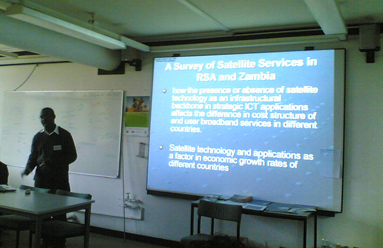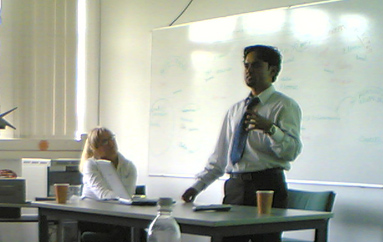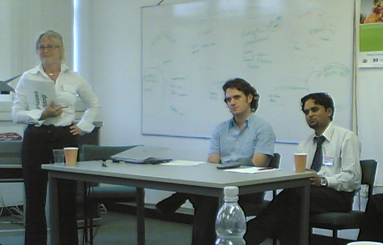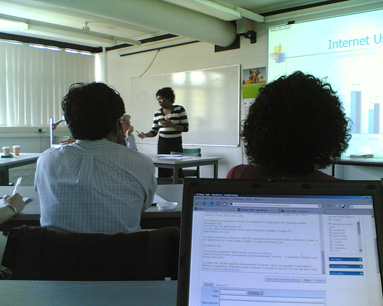By Ismael Peña-López (@ictlogist), 14 September 2006
Main categories: ICT4D, Meetings
Other tags: ict4d_symposium_2006
No Comments »
This is the Annual ICT4D Postgraduate Symposium fourth session briefing. It took place in Egham, September 14th, 2006, evening. Here come the notes I took on the fly:
Just before starting the session, Dorothea Kleine encourages the audience to write ICT4D academic articles to be published in the Information Technologies and International Development Journal which, let’s remember, is Open Access since WSIS Tunis 2005.
Evans N. Mupela, Walter Sisulu University / UNU-MERIT
Economics of satellite technologies: fuelling the fifth long wave for African development

Evans Mupela
Can African countries take advantage of the ICT technological paradigm driving the fifth [Kondratiev’s] long wave to foster economic growth and development in the region? If yes, how?
Main goal: provide theoretical evidence of ICT driven economic growth, seeing if satellites can contribute in this ICT-driven growth (building a model). This model will be the like of a Public Good Model of Cyberspace, being cyberspace network the public good, and ICT applications running through the networ, are the GPT utilities. Utilities are organized by service providers at firm level, and levies drastically reduced because service providers would not charge for the network they don’t own (because it’s public).
First Annual ICT4D Postgraduate Symposium (2006)
By Ismael Peña-López (@ictlogist), 14 September 2006
Main categories: ICT4D, Meetings
Other tags: ict4d_symposium_2006
No Comments »
This is the Annual ICT4D Postgraduate Symposium third session briefing. It took place in Egham, September 14th, 2006, late afternoon. Here come the notes I took on the fly:
Adesina Iluyemi, Queen Mary’s University of London
Handheld computers as an empowerment tool for a community health worker (CHW) in developing countries
Five strategies of the Ottawa Charter 1986:
- supportive environment
- strengthen community action
- develop personal skills
- healthy public policy
- reorient public policy
CHW work closely with families and are an intereface with population in the community, providing essential health care services. Thus, we should foster CHW as a development figure.
Provided the (proven) features of PDAs, let’s empower CHWs with those devices, in three levels: intrapersonal, interactional and behavioural. Besides, being most CHWs women, empowerment becomes also relevant under the gender (e-)inclusion point of view.
Nikos Nikolidakis, Freie Universität Berlin
Success factors in ICT4D projects: comparative case studies from South Africa
Comparing theory, macro and micro concepts of “success” and factors of success.
Preliminary results:
- Macro level: functioning network between stakeholders
- Macro level: existing national ICT strategy, oriented towards social development (vs. infrastructure development), regulating delivery of ICT infrastructure, concerned with capacity building, being flexible, having an implementation plan.
- Micro level: “it’s not about technology”, commitment of stakeholders, embedded in sufficient infrastructure, participation of potential beneficiaries, embedded in local environment, managed as business model (“it’s not evil to charge the beneficiary… provided he can afford it”), flexible and easy to use and cheap technology.

Hari Krishna Neupane (front), Gudrun Wicander (back left)
Hari Krishna Neupane, London Metropolitan University
Youth & ICT Entrepreneurship: a highly prospective and demanding factor for Socio-economic changes in developing countries – Case Studies from Nepal
Why Business Process Outsourcing (BPO) is gaining quota: the key to success in ramping up talent in a BPO environment is a rapid training module. The training component has to be seen as an important sub-process, requiring constant re-engineering, with remarkable employee benefits. This makes the BPO able to give numerous services (tech, customer, etc.)
ICT Entrepreneurship can have a powerful and direct impact on socio-economic development through employment generation, contribution in national economy, automation of business entreprises and backbone for e-Governance, e-Commerce, Telemedicine, and the Information Society in general.
Urgent necessity: effective implementation of the IT policies and Cyberloaw, development priorities such as attracting foreign investment in IT sector, access to start-up funding and/or business incubators to convert ‘job-seekers’ into ‘job-creators’.

Left to right: Gudrun Wicander, Nikos Nikolidakis, Hari Krishna Neupane
First Annual ICT4D Postgraduate Symposium (2006)
By Ismael Peña-López (@ictlogist), 14 September 2006
Main categories: ICT4D, Meetings
Other tags: ict4d_symposium_2006
No Comments »
This is the Annual ICT4D Postgraduate Symposium second session briefing. It took place in Egham, September 14th, 2006, afternoon. Here come the notes I took on the fly:
Peter Rawsthorne, Memorial University of Newfoundland
The role of the critical technologist within ICT4D
Critical technology = technology + pedagogy + development (ICT4D = technology + development; critital pedagogy = pedagogy + development; constructivism = pedagogy + technology)
Critical Technologist:
- Can dig a well as esasiy as teach a grade six clas or setup a wireless LAN
- no fixed idea of the solution
Sian Aggett, Royal Holloway University of London
Onwards Youth
Participatory video: communities doing their own films, where the process is as important as the product. The (research) question being: can participatory video empower the community? and if yes, how?
Empowerment:
- Engaging with external resources
- Development of critical consciousness and community awareness
- Group cohesion
- Creativity
- Shaking off fear
- Sense of efficacy

David Crespo
David Crespo, Royal Holloway University of London
mHealth: some Challenges
The quickes way to get off poverty right now is to have one mobile telephone
(Muhammad Yunus, Grameen Bank)
The most urgent task befor us is to get medical and health knowledge
(James Grant, UNICEF)
Adavantages of cellular phone (for development):
- Low infrastructure investement
- Ease to use
- Energy
- Affordability of services and devices
- Overcoming unfavorable geographic structures
- Less vulnerability to vandalism and “natural” disasters
Besides:
- if there’s great connectivity/coverage of signal, perhaps cellular is better than PC, whose connectivity might be not that good.
- PDAs have been tested for e-Health/Telemedicine… with increasing processing capabilities of cellulars (+connectivity), why not go mobile?
Good practices: Voxiva technology
First Annual ICT4D Postgraduate Symposium (2006)
By Ismael Peña-López (@ictlogist), 14 September 2006
Main categories: ICT4D, Meetings
Other tags: ict4d_symposium_2006
1 Comment »
Just a couple of words before highlighting the presentations during the first session of the Annual ICT4D Postgraduate Symposium organized by the ICT4D Collective at Royal Holloway, University of London.
The effort done by the ICT4D Collective is impressive: the idea of organizing this first edition of the symposium is only equaled by the massive response of attendants (I counted 33 people in total), coming from (almost) all over the world (I mean it) and many and one disciplines (most interesting part, no doubt). Personal thanks go to Tim Unwin, Marije Geldof and all of the other collective members.
First session took place in Egham, September 14th, 2006, morning. Here come the notes I took on the fly:
Isabella Rega, University of Lugano
Telecentres and Social Meanings: a South Africa case study
The (main) hypothesis of the research is whether the social meaning which a community gives to a telecentre strogly affect its (not-) use and the socioeconomic impact of the telecentre in the community.
Infomobilisation (similar concept — if not same — as informational literacy): “helping the community to understand and express its information needs and showing people how they can reach this information through new technologies”
Social meaning: difference on what the (telecenter) designer thinks of a service and what the community that will use thinks of it: same telecenter designed by person in i.e. NYC than the one designed by its user in rural Africa?
Elfneh Bariso, AHEAD/IOE
The Digital Dividend in an Ethiopian context: Ahead’s plan 4 a community college
[disclaimer: actually not a PhD research, but an ongoing project: www.ahead.org.uk]
Awareness of importance of Health and information about Health.
Technological divide (in Ethiopia): (almost) no computers, (almost) no TVs, lotta radio sets.
Why optimism about digital dividend?
Technorealist, no technooptimist, no luddite.

Kutoma Jacqueline Wakunuma during her presentation
… and me blogging the event.
Andrew Babson, University of Michigan
Literacy through multimedia in rural, multilingual communities: Bridges to the Future Initiative, South Africa
Research the potential success of multimedia ICT applications for teaching multiple languages:
- Test the application
- Test what’s the oppinion of the user of learning languages through ICT applications.
Main preliminary conclusoin: Education generally and/or English and/or computers is seen as an opportunity, so it encourages students to keep on learning.
Kutoma Jacqueline Wakunuma, Coventry University
Is Socio-Economic Development and Empowerment a Reality – A Gendered Zambian Case Study
Main axe: Gender equality empowerment of women. Thus, how gender is implicated in different experiences of women & men in relation to access & use of ICTs and see which they believe are most effective.
Main conluding perspective: Mobile phones seem more relevant than the Internet.
First Annual ICT4D Postgraduate Symposium (2006)






